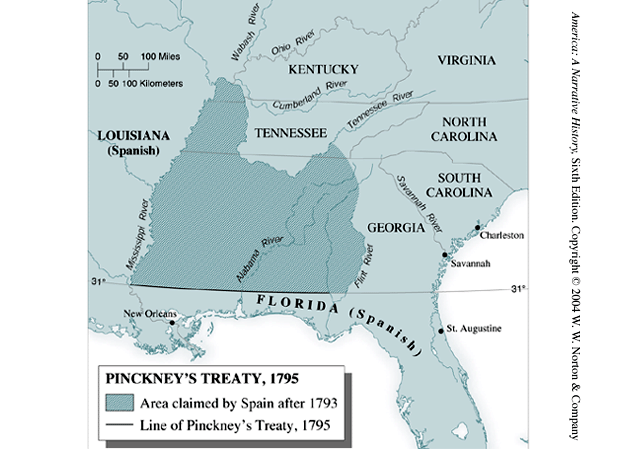ObjectivesHow, why and to what extent the leadership and presidency of George Washington established a stronger national government. (Structure of government, separation of powers with checks and balances).
• How the views of Federalists and Anti-Federalists, such as Alexander Hamilton and Thomas Jefferson, shaped the development of American economic and political institutions. (Federalism, equal justice under the law, rule of law, private property rights, individual rights as set forth in the Bill of Rights) • How the early decisions of Chief Justice John Marshall and the United States Supreme Court increased the power and authority of the national government. (Structure of government, separation of powers with checks and balances) • How government policies and action influenced the patterns of migration and settlement along the Western frontier (e.g., Land Ordinance of 1785, Northwest Ordinance of 1787, Louisiana Purchase/Lewis and Clark Expedition, Mexican War, Gadsden Purchase, Kansas-Nebraska Act, Homestead Act). (Emphasis on topics in bold italics) • How, why and to what extent the early republic adhered to a foreign policy of isolationism and neutrality, especially in the wake of the French Revolution. • How the French Revolution tested the neutrality and impacted the foreign policy and politics of the United States. • How and why did the Democratic-Republicans oppose the US Quasi War with France? • How and why political parties continued to debate the proper role of government long after the War for Independence ended. • How and to what extent American participation in and debate over war shaped the development and platforms of national political parties. (Federalism, individual responsibility) Combine this and objective above and conduct a mock election from this time period – should be Election of 1800) • How the nation’s maritime trade interests tested American neutrality and led to undeclared naval wars with foreign states during the early republic. • How war between Britain and France impacted American trade and shipping leading up to the War of 1812. • How wars and conflicts, such as the War of 1812 and Civil War, influenced the development of the nation’s industrial base. (Federalism, private property rights) • How, why and the extent to which maritime rights and/or territorial expansion led to the War of 1812. • How and why Adam Smith and The Wealth of Nations impacted the creation and development of the United States as a capitalistic and free market society. • How, why and to what extent the War of 1812 promoted nationalism and patriotism in the United States. • How and why did the Federalists oppose the war of 1812 with Britain? • How empirical conflict between Great Britain and France tested the neutrality of the United States. • How and why the War of 1812 created a stronger national government and sense of nationalism/patriotism among United States citizens. • How various diplomatic treaties/agreements (Louisiana Purchase, Pinckney’s Treaty, Adams-Onis) enabled political security and nationalism • How, why, and to what extent executive, judicial and legislative decisions may have increased the power and authority of the federal government (the Judiciary Act of 1789, Marbury v. Madison, the Louisiana Purchase, the Monroe Doctrine, the bank wars, the “Emancipation Proclamation” and the Compromise of 1877). (Structure of government, separation of powers with checks and balances, federalism, due process) • How and to what extent international trade policies and diplomatic agreements, such as embargos, tariffs and treaties shaped the development of foreign policy as well as sectional interests within the United States (e.g., Jay’s Treaty, Embargo of 1807, Treaty of Ghent). • To what extent the Monroe Doctrine secured the nation’s dominant economic and political role in the Western Hemisphere. • How and to what extent civil liberties were impacted by various wars and conflicts. (Alien & Sedition Acts) • How political platforms, campaigns and elections impacted the distribution of power within the institutions of national government and between the states and nation (e.g., elections and campaigns of 1800 Federalist and Democratic-Republican platforms). (Structure of government, separation of powers with checks and balances, federalism, frequent and free elections in a representative government) • How the advancement of printing technologies and the availability of popular literature, through pamphlets, newspapers and magazines, impacted American culture from the Revolution to the Civil War. ). Key Terms Judiciary Act of 1789 Strict vs. loose interpretation of the Constitution Hamilton vs. Jefferson and the development of the two-party system Hamilton’s Economic Plan First Bank of the United States Whiskey Rebellion Federalist Party Democratic-Republican Party President Washington’s Proclamation of Neutrality Citizen Genet Jay's Treaty President Washington’s Farewell Address Election of 1800/"Revolution of 1800" “Midnight Judges” Laissez-faire Marbury v. Madison, (1803)* John Marshall Gibbons vs. Ogden McCulloch vs Maryland Charles River Bridge Dartmouth College vs. Woodward Louisiana Purchase Lewis & Clark Burr-Hamilton Duel Alien & Sedition Acts Virginia & Kentucky Resolutions nullification Adams-Onis Treaty Jay’s Treaty Pinckney’s Treaty Suffrage requirements Treaty of Greenville 1796 Quasi War XYZ Affair* Convention of 1800 Tripoli War Impressment of seamen British Orders in Council Chesapeake Affair Embargo Act 1807 Nonintercourse Act Force Act Macon's Bill #2 War Hawks Tecumseh War of 1812 (causes and results) Hartford Convention (1814) Battle of New Orleans Treaty of Ghent |
ResourcesGuided Reading Hamilton Economic Plan
Hamilton vs. Jefferson SHEG Lesson Washington's Farewell Address (abridged) Gilder Lehrman Lesson for above Federalists vs. Democratic-Republican Debate Alt. Lesson (Honors Level) Source #1 Source #2 Source #3 Source #4 (Honors Level) EdSitement Lesson on Alien & Sedition Acts Adams and Alien & Sedition Acts worksheet Causes of War of 1812 worksheet War of 1812 Primary Sources & Questions activity Review puzzle (online version) Review puzzle PDF |
